In the rapidly evolving world of electric vehicles, the competition is fierce, especially among manufacturers known for their innovation and quality. Two powerhouses, the BMW iX1 and Skoda Enyaq, stand out in the SUV segment, offering impressive electric ranges, performance, and state-of-the-art technology. This article dives deep into a comprehensive comparison of these two models, exploring their technical specifications and innovations.
BMW iX1 vs Skoda Enyaq - Differences and prices compared
Compare performance (313 HP vs 340 HP), boot space and price (42300 £ vs 41900 £ ) at a glance. Find out which car is the better choice for you – BMW iX1 or Skoda Enyaq?
Design and Dimensions
The BMW iX1 presents a modern, robust design typical of the brand’s BMW X series. It measures 4500 mm in length, 1845 mm in width, and 1616 mm in height, providing a balanced and athletic stance that appeals to a wide-ranging audience. The Skoda Enyaq, slightly larger, boasts dimensions that range from 4649 mm to 4658 mm in length, 1879 mm in width, and a similar height around 1620 mm. This larger footprint contributes to a spacious cabin and additional cargo space.
Powertrains and Performance
Under the hood, both vehicles offer powerful electric drivetrains. The BMW iX1 comes with two options: a front-wheel-drive variant producing 204 HP and an all-wheel-drive version delivering 313 HP. In terms of acceleration, the iX1 reaches 0-100 km/h in just 5.6 seconds for the more powerful variant. Meanwhile, the Skoda Enyaq offers a range of power levels, from 204 HP to a sporty 340 HP, allowing for a 0-100 km/h acceleration in as little as 5.5 seconds. Both models feature automatic transmissions with a reduction gearbox, ensuring a smooth driving experience.
Electric Range and Efficiency
When it comes to efficiency, the iX1 boasts a consumption rate between 15.8 kWh/100 km and 17.1 kWh/100 km, with an electric range of up to 463 km. The Enyaq, on the other hand, excels with a wider variety of options that allow it to achieve ranges up to 587 km, with consumption figures that average around 14.6 to 16.1 kWh/100 km depending on the variant chosen. This makes the Enyaq one of the most efficient SUVs in this segment, allowing drivers longer journeys without needing a charge.
Charging and Battery Capacity
The BMW iX1 is equipped with a battery capacity of 64.8 kWh, while the Skoda Enyaq offers two battery options: a 59 kWh variant and a larger 77 kWh variant. The faster charging times provided by both make them appealing choices for those conscious about charging infrastructure. The Enyaq’s larger battery capacity means fewer stops during long travels, providing greater flexibility for drivers.
Interior Space and Comfort
Both vehicles cater to families and those needing space with a similar seating capacity of five. The iX1 offers a trunk capacity of 490 liters, whereas the Enyaq surpasses it with up to 585 liters. This added space in the Skoda enhances practicality, especially for those who frequently travel with luggage or equipment. Interior features in both models include advanced infotainment systems, allowing seamless connectivity and navigation.
Safety and Innovations
Both the iX1 and Enyaq prioritize safety, featuring multiple airbags, advanced driver assistance systems, and top-rated crash test results. BMW’s iX1 comes with adaptive cruise control, lane-keeping assistance, and park assist, while Skoda embraces a comparable suite of safety technologies, including adaptive lighting and a parking assist feature. Innovative tech solutions like augmented reality head-up displays (in the iX1) offer additional value to tech-savvy drivers.
Conclusion
In conclusion, both the BMW iX1 and Skoda Enyaq present compelling choices for anyone in the market for an electric SUV. The iX1 boasts BMW’s performance and luxury heritage, while the Enyaq prides itself on efficiency and practicality. The final decision may come down to personal preferences regarding style, brand loyalty, or which features resonate more with your driving needs. Ultimately, as the electric vehicle market continues to evolve, both of these models are set to make significant impacts.
Video - Skoda Enyaq
Here’s where it gets real: The technical differences in detail
Costs and Efficiency:
Looking at overall running costs, both models reveal some interesting differences in everyday economy.
Skoda Enyaq has a minimal advantage in terms of price – it starts at 41900 £ , while the BMW iX1 costs 42300 £ . That’s a price difference of around 428 £.
In terms of energy consumption, the advantage goes to the BMW iX1: with 14.30 kWh per 100 km, it’s hardly perceptible more efficient than the Skoda Enyaq with 14.80 kWh. That’s a difference of about 0.50 kWh.
As for electric range, the Skoda Enyaq performs somewhat better – achieving up to 587 km, about 73 km more than the BMW iX1.
Engine and Performance:
Power, torque and acceleration say a lot about how a car feels on the road. This is where you see which model delivers more driving dynamics.
When it comes to engine power, the Skoda Enyaq has a hardly perceptible edge – offering 340 HP compared to 313 HP. That’s roughly 27 HP more horsepower.
In acceleration from 0 to 100 km/h, the Skoda Enyaq is hardly perceptible quicker – completing the sprint in 5.40 s, while the BMW iX1 takes 5.60 s. That’s about 0.20 s faster.
There’s also a difference in torque: Skoda Enyaq pulls distinct stronger with 679 Nm compared to 494 Nm. That’s about 185 Nm difference.
Space and Everyday Use:
Whether family car or daily driver – which one offers more room, flexibility and comfort?
Both vehicles offer seating for 5 people.
In curb weight, BMW iX1 is somewhat lighter – 1940 kg compared to 2179 kg. The difference is around 239 kg.
In terms of boot space, the Skoda Enyaq offers somewhat more room – 585 L compared to 490 L. That’s a difference of about 95 L.
When it comes to payload, BMW iX1 slight takes the win – 495 kg compared to 489 kg. That’s a difference of about 6 kg.
Who wins the race in the data check?
The Skoda Enyaq is clearly ahead overall in the objective data comparison.
This result only shows which model scores more points on paper – not which of the two cars feels right for you.
Costs and Consumption
View detailed analysis
Engine and Performance
View detailed analysis
Dimensions and Body
View detailed analysis
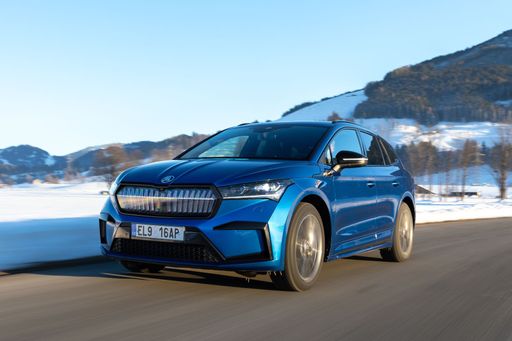
Skoda Enyaq
BMW iX1
The BMW iX1 wraps BMW's electric ambition into a compact SUV package that feels unexpectedly premium, with sharp handling and a crisp, modern cabin that keeps the driver in charge. It's ideal for buyers who want a stylish, quiet daily driver with useful practicality and tech-savvy touches — plus enough character to make the commute feel less like a chore and more like a short joyride.
details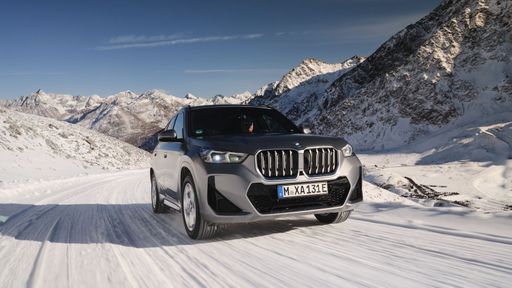
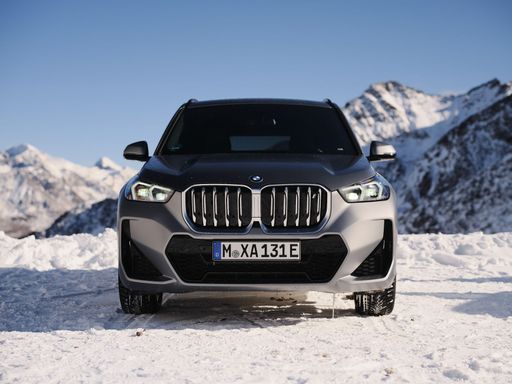
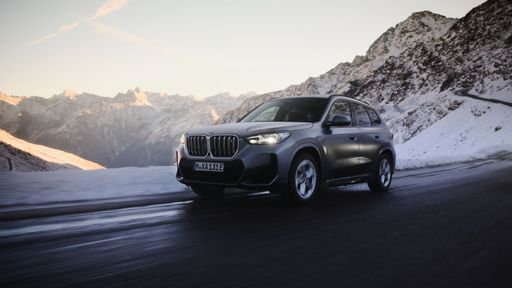
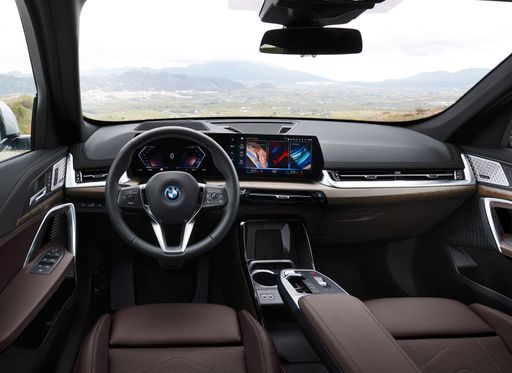
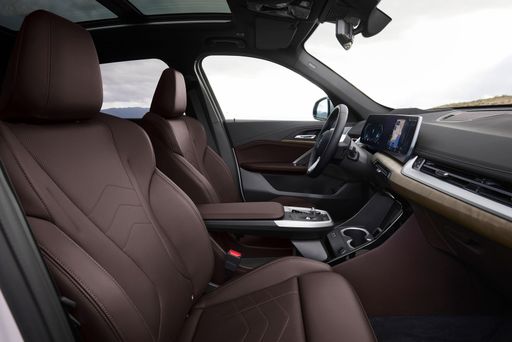
Skoda Enyaq
The Skoda Enyaq is a cleverly packaged electric SUV that blends roomy, pragmatic family space with clean, Czech design and sensible value. On the road it’s unshowy but composed, offering serene electric performance and easy-to-use tech — the kind of car that makes daily life smoother without trying too hard.
details

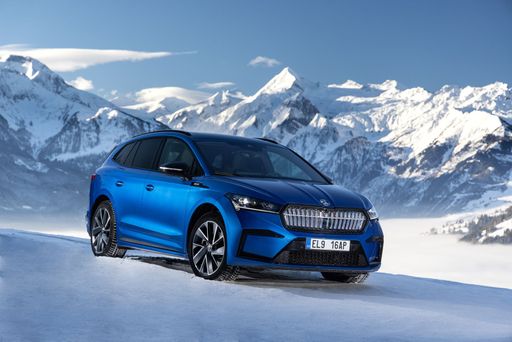

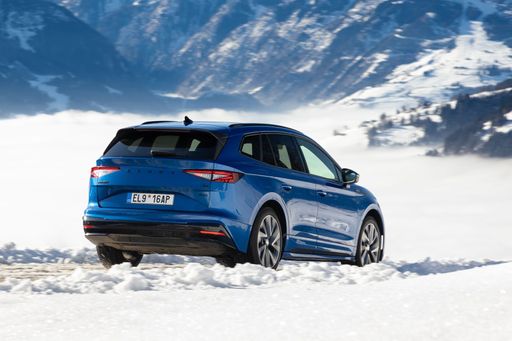
Costs and Consumption |
|
|---|---|
|
Price
42300 - 55200 £
|
Price
41900 - 52200 £
|
|
Consumption L/100km
-
|
Consumption L/100km
-
|
|
Consumption kWh/100km
14.3 - 15.7 kWh
|
Consumption kWh/100km
14.8 - 16.2 kWh
|
|
Electric Range
466 - 514 km
|
Electric Range
538 - 587 km
|
|
Battery Capacity
-
|
Battery Capacity
77 kWh
|
|
co2
0 g/km
|
co2
0 g/km
|
|
Fuel tank capacity
-
|
Fuel tank capacity
-
|
Dimensions and Body |
|
|---|---|
|
Body Type
SUV
|
Body Type
SUV
|
|
Seats
5
|
Seats
5
|
|
Doors
-
|
Doors
5
|
|
Curb weight
1940 - 2085 kg
|
Curb weight
2179 - 2293 kg
|
|
Trunk capacity
490 L
|
Trunk capacity
570 - 585 L
|
|
Length
-
|
Length
4658 mm
|
|
Width
1845 mm
|
Width
1879 mm
|
|
Height
-
|
Height
1620 - 1621 mm
|
|
Max trunk capacity
-
|
Max trunk capacity
1610 - 1710 L
|
|
Payload
495 kg
|
Payload
443 - 489 kg
|
Engine and Performance |
|
|---|---|
|
Engine Type
Electric
|
Engine Type
Electric
|
|
Transmission
Automatic
|
Transmission
Automatic
|
|
Transmission Detail
Reduction Gearbox
|
Transmission Detail
Reduction Gearbox
|
|
Drive Type
Front-Wheel Drive, All-Wheel Drive
|
Drive Type
Rear-Wheel Drive, All-Wheel Drive
|
|
Power HP
204 - 313 HP
|
Power HP
286 - 340 HP
|
|
Acceleration 0-100km/h
5.6 - 8.6 s
|
Acceleration 0-100km/h
5.4 - 6.7 s
|
|
Max Speed
-
|
Max Speed
180 km/h
|
|
Torque
250 - 494 Nm
|
Torque
545 - 679 Nm
|
|
Number of Cylinders
-
|
Number of Cylinders
-
|
|
Power kW
150 - 230 kW
|
Power kW
210 - 250 kW
|
|
Engine capacity
-
|
Engine capacity
-
|
General |
|
|---|---|
|
Model Year
2026
|
Model Year
2025
|
|
CO2 Efficiency Class
A
|
CO2 Efficiency Class
A
|
|
Brand
BMW
|
Brand
Skoda
|
Is the BMW iX1 offered with different drivetrains?
The BMW iX1 is available as Front-Wheel Drive or All-Wheel Drive.
